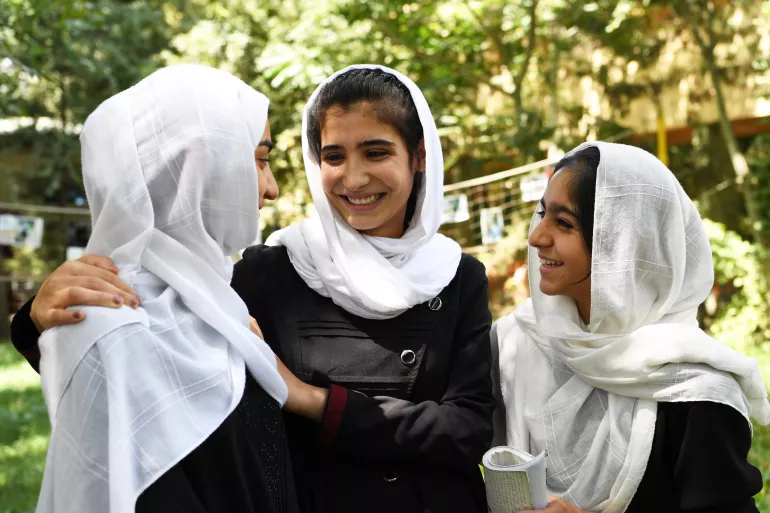Celebration of Menstruation Hygiene Management Day in Afghanistan
It is time for action

KABUL, Afghanistan, 30 October 2019 – Today, on Girls' Hygiene Day, Afghanistan renews its commitment to educate girls on menstruation management and good hygiene; accelerate and intensify on awareness raising to mitigate social taboos; as well as catalyze action for one of the most neglected social issues; menstruation and menstrual hygiene management (MHM).
The theme for 2019 is, “It is time for action”. This is a clarion call for everyone, at all levels, including families, schools and communities, to take deliberate and concrete action, to eradicate the stigma and negative conceptions around menstrual hygiene, and provide girls with equal opportunity to maximise their potential.
HE. Rula Ghani (Bibi Gul), First Lady of the Islamic Republic of Afghanistan, in collaboration with the Ministers of Education, Public Health, Women Affairs, as well as Rural Rehabilitation and Development, together with international partners, today in Kabul, collectively made a commitment to break the silence on menstrual hygiene for the wellbeing of every girl. “Adequate personal hygiene and nutrition during adolescence are important and help young girls to grow to their full potential and protect themselves from the most common and debilitating health problems, says the First Lady and patroness of girl’s education and empowerment.
Girls need accurate information and improved sanitation facilities in schools, to manage their hygiene, particularly during their menstrual period. Lack of information about menstruation hygiene put young girls in shock, stress and discomfort.
Since MHM is a multi-sectoral issue, efforts have been made to ensure integration between WASH, education, gender and nutrition sectors to improve MHM. UNICEF in coordination with Ministry of Education advocated for action by partners on MHM amongst adolescent girls in schools. In 2019, UNICEF published more than 100,000 copies of the MHM booklets in Dari and Pashto, distributed in about 1,250 school across 22 of the 34 provinces in the country. Some 300 teachers were also trained on the MHM guidelines.
Speaking at the event, Dr Mohammad Mirwais Balkhi, the Minister of Education said, “Girls have an irrevocable right to education, which is lost if they feel unable to attend lessons because of a lack of sanitary products or clean, private toilets at school. Governments simply need to ensure that every school has clean water, decent toilets and good hygiene."
Lack of knowledge and inadequate facilities can lead to girls missing out on learning, and sometimes resulting in dropping out of school during menstruation. Girls' Hygiene Day is celebrated to the show commitment of government and partner agencies to enhance the rights of girls and reduce inequalities.
UNICEF Representative for Afghanistan, Dr Aboubacar Kampo, described the day as an important occasion to break taboos and encourage girls to grow into healthy and informed women, who can share their well-being with their families and communities. “It is our collective responsibility to ensure that every girl is equipped with accurate information on menstruation as a normal biological process. Educating girls on menstruation management builds their self-esteem, and confidence. It also contributes to social solidarity, encouraging healthy personal hygiene practices among girls”.
Current evidence and key findings indicate that 70 per cent of girls do not take bath or shower during menstruation for fear of infertility; 29 per cent of girls reported to miss some school days when they were having their menses; some 80% girls were not allowed to attend social events such as weddings, or funerals, or going to shrines during menstruation; and that 50 per-cent girls were not aware of menstruation until first period started.
Malalai, 15-year-old, is in grade 9, at the Fatehmatul Zahra school in Paktika province in central Afghanistan, Malalai encouraged her classmates that girls should take a bath during menstruation, “we should never miss out on education, as mensuration is not a disease, but a natural part of our growing up. We only need to know how to take care of ourselves properly”.
Media contacts
About UNICEF
UNICEF promotes the rights and wellbeing of every child, in everything we do. Together with our partners, we work in 190 countries and territories to translate that commitment into practical action, focusing special effort on reaching the most vulnerable and excluded children, to the benefit of all children, everywhere.
For more information about UNICEF and its work for children in Afghanistan, visit www.unicef.org/afghanistan.
Follow UNICEF Afghanistan on Twitter, Facebook and Instagram.




